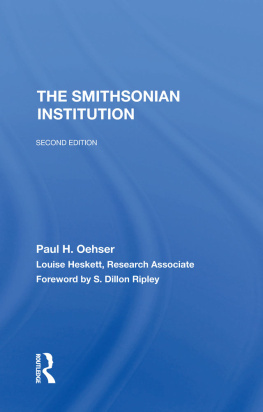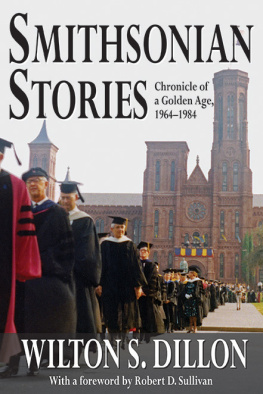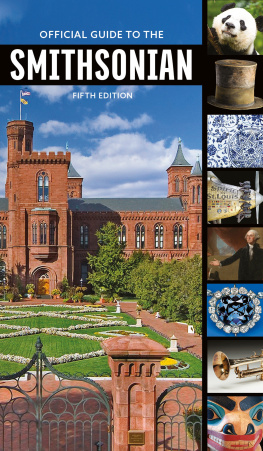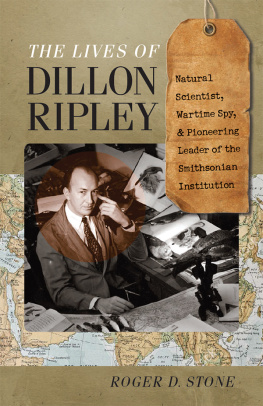Paul H. Oehser - The Smithsonian Institution
Here you can read online Paul H. Oehser - The Smithsonian Institution full text of the book (entire story) in english for free. Download pdf and epub, get meaning, cover and reviews about this ebook. year: 2019, publisher: Routledge, genre: Science. Description of the work, (preface) as well as reviews are available. Best literature library LitArk.com created for fans of good reading and offers a wide selection of genres:
Romance novel
Science fiction
Adventure
Detective
Science
History
Home and family
Prose
Art
Politics
Computer
Non-fiction
Religion
Business
Children
Humor
Choose a favorite category and find really read worthwhile books. Enjoy immersion in the world of imagination, feel the emotions of the characters or learn something new for yourself, make an fascinating discovery.
- Book:The Smithsonian Institution
- Author:
- Publisher:Routledge
- Genre:
- Year:2019
- Rating:4 / 5
- Favourites:Add to favourites
- Your mark:
- 80
- 1
- 2
- 3
- 4
- 5
The Smithsonian Institution: summary, description and annotation
We offer to read an annotation, description, summary or preface (depends on what the author of the book "The Smithsonian Institution" wrote himself). If you haven't found the necessary information about the book — write in the comments, we will try to find it.
The Smithsonian Institution — read online for free the complete book (whole text) full work
Below is the text of the book, divided by pages. System saving the place of the last page read, allows you to conveniently read the book "The Smithsonian Institution" online for free, without having to search again every time where you left off. Put a bookmark, and you can go to the page where you finished reading at any time.
Font size:
Interval:
Bookmark:
Louise Heskett, Research Associate

52 Vanderbilt Avenue, New York, NY 10017
2 Park Square, Milton Park, Abingdon, Oxon OX14 4RN
Product or corporate names may be trademarks or registered trademarks, and are used only for identification and explanation without intent to infringe.
Oehser, Paul Henry, 1904
The Smithsonian Institution.
(Westview library of federal departments, agencies, and systems)
Bibliography: p.
Includes index.
1. Smithsonian Institution. I. Heskett, Louise. II. Title. III. Series.
Q11.S8039 1983 069'.09753 83-7026
In the memory of man when vain titles
Are forgotten. But who am I to boast?
You ask me my name. Well, I will tell you...
And noble prince Hugh Percy (born Hugh Smithson),
The Earl and first Duke of Northumberland,
Earl Percy, Baron Warkworth and Lovaine,
Lord Lieutenant and Custos Rotulorum
Of Middlesex and Northumberland Counties
And of all America, and a Lord
Of His Majesty's most Honorable
And Privy Council and Knight of the most
Noble Order of the Garter, et cetera
One of the handsomest men in all England.
And my mother? Elizabeth Keate Macie,
The heiress of the Hungerfords of Studley,
A widow, and descended from a King...
The best blood of England flows in my veins,
Yet this avails me not. But who am I?
I am James Lewis Macie, or James Smithson,
A commoner, born in France out of wedlock,
Master of Arts from Pembroke College, Oxford,
Fellow of the Royal Society.
Like Sidney, two hundred years ago now,
' I never heard the ancient song of Percy
And Douglas that I found not my heart moved
More than with a trumpet.' Save for a marriage
I'd be a Percy too. I've felt it keen,
But think me not bitter about it now
That was long ago. Now I'm getting on:
I am sixty-one and must think of death;
I am lonely and ill; there's not much left
For metwo, or three, or four years, perhaps...
No error without evil, and therefore
I have loved truth and have dabbled in science;
That has been my pleasure, and it may be
(Who knows?) 1 have enlarged those lurid specks
In the vast field of darkness. But also
I have loved fame, that 'last infirmity
Of noble mind.' 'Fame is the spur,' said Milton.
Now by this earth's wealth which has come to me
I vow to make it true as I have dreamed:
The name of Smithson shall be linked with truth
And with the spread of knowledge through the world,
For ignorance has been my enemy
As it is all mankind's."
With deliberate speech and firm countenance,
He took up his pen and began to write
These bare words:
And Elizabeth... this twenty-third day
Of October, year eighteen twenty-six,
Do make this my last will and testament...
And I bequeath ... to the United States
Of America all my property
To found at Washington an Institution ..."
"I shall not altogether die," he said;
"Smithson shall live when Percys are extinct,
Until the world at last shall know the truth
And be forever free."
- vi
- xv
- xvi
Font size:
Interval:
Bookmark:
Similar books «The Smithsonian Institution»
Look at similar books to The Smithsonian Institution. We have selected literature similar in name and meaning in the hope of providing readers with more options to find new, interesting, not yet read works.
Discussion, reviews of the book The Smithsonian Institution and just readers' own opinions. Leave your comments, write what you think about the work, its meaning or the main characters. Specify what exactly you liked and what you didn't like, and why you think so.







